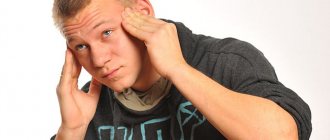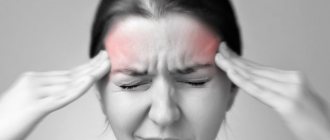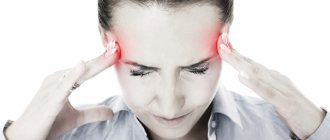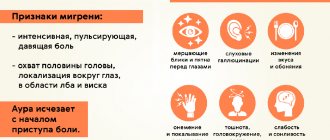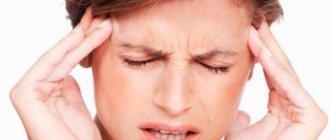These are organic somatic diseases or diseases with a known pathophysiological disorder, the development and course of which is associated with the influence of psychological factors. The use of this term to designate somatoform, somatized disorders, and especially personality reactions to illness, as A.B. Smulevich does, is quite controversial. Firstly, because somatoform disorders can be those that only imitate somatic pathology. Secondly, due to the fact that somatization is considered a mental disorder in the clinical structure of which there is a clinically significant imbalance towards the predominance of somatic symptoms. Thirdly, for the reason that the individual’s reaction to illness, or, more precisely, to how this individual perceives his illness, is manifested not only by psychosomatic symptoms, moreover, it is not these symptoms that determine the clinical nature of nosogeny.
Hypochondria, physical complaints in affective disorders and physical pathology in addiction diseases are not psychosomatic diseases.
Insomnia “became” the first psychosomatic disorder, then ulcerative colitis, peptic ulcers, migraine headaches, bronchial asthma, rheumatoid arthritis, and later some other diseases were classified as psychosomatic pathologies. The nature of psychosomatic illnesses is completely incomprehensible and unknowable if, following Descartes, we divide the body and soul as some absolute entities independent of one another. K. Jaspers believes that “the border here is quite shaky.” Nevertheless, he is in no hurry to agree with von Weizsäcker, who strives to find a psychologically understandable element in any disease.
An explanatory hypothesis could be that psychophysiological structures somehow influence the activity of internal organs. It is still not clear what exactly traumatic situations contribute to the development of psychosomatic diseases. It is believed that such development is favored by high and prolonged, throughout the year, stress load. There is a hypothesis that different and especially alexithymic individuals are prone to different psychosomatic diseases, as well as a hypothesis that different diseases are caused by different conflicts. Some researchers are of the opinion that diseases are caused by nonspecific generalized anxiety that accompanies conflicts of various types. The link between stress and psychosomatic illness is believed to be the autonomic nervous system and the endocrine system (anterior pituitary-hypothalamic-adrenal axis). Let us consider psychosomatic diseases according to the somatic systems that are affected.
The cardiovascular system
1. Coronary artery disease. Causes myocardial ischemia. It is characterized by episodic subcardial pain (angina attacks), discomfort, and pressure. Coronary insufficiency in a significant proportion of cases leads to the development of myocardial infarction. F. Dunbar described the personality of coronary patients as aggressive-compulsive - with the desire to work hard and gain authority. Later Friedman and
Rosenman identified Type A and Type B personalities, with Type A being more associated with the development of coronary heart disease. Type A personalities are action-oriented and hostilely competitive. Type B personalities, on the other hand, are calm, less aggressive, and fight less hard for their goals. In personality type A, the amount of low-density lipoprotein, serum cholesterol, triglycerides and 17-hydroxycorticosteroids is increased, which contributes to the development of coronary heart disease. When treating the disease, tranquilizers (for example, diazepam) are prescribed to ease psychological disturbances. For pain, narcotic analgesics (for example, morphine) are used. Psychotherapy is needed to maintain morale, confidence in recovery, and reduce stress, compulsion and tension.
2. Severe hypertension . Arterial hypertension is an increase in blood pressure to 160/65 or higher. Common (eg, 20% of American adults). Persons with high blood pressure are quite adequate in appearance. They complain a lot, are compulsive, and can accumulate rage, although they do not openly express anger. The disease is promoted by genetic predisposition; the tendency to suppress and repress anger translates it into illness. In addition to antihypertensive drugs (capoten, capazid, enalapril, ednit, diraton, cardaflex, etc.), supportive and behavioral psychotherapy (for example, meditation, relaxation, bioreinforcement) is successfully used in treatment.
3. Heart failure. A decrease in the volume of blood ejected by the heart reduces tissue blood flow, leading to stagnation of blood in both circulation circles. Conflicts and mental trauma often influence the onset or exacerbation of the disease. Psychotherapy therefore plays an important role in the treatment of the disease.
4. Vasomotor (vasodepressive) syncope. As a result of a decrease in sympathoadrenal and increase in vagoinsular activity, the volume of ejected blood decreases, due to vasodilation, peripheral vascular resistance decreases, and bradycardia develops. Poor blood supply to the brain and hypoxia cause fainting. All these processes seem to be triggered by fright or acute fear. Psychotherapy is needed: determining the cause of mental trauma and increasing resistance to it. In case of orthostatic collapse, the patient is recommended to slowly move to a standing position; During fainting, the patient's legs should be elevated.
5. Cardiac arrhythmias. Life-threatening arrhythmias (ventricular tachycardia, ventricular fibrillation), sinus tachycardia, ST and T wave changes, ventricular ectopy, increased plasma catecholamines and free fatty acid concentrations may be associated with emotional trauma. Emotional arrhythmia requires psychotherapy and beta blockers.
| | Arrhythmia can be one of the many symptoms of a panic attack |
6. Psychogenic cardiac complaints in persons who do not suffer from heart disease. We are talking about cardiophobia and even delusions of heart disease, which refers to an anxiety disorder; in ICD-10 it is mentioned among the manifestations of somatoform autonomic dysfunction as Da Costa syndrome (G45.30). This is also a syndrome of "neurocirculatory asthenia", described by Da Costa under the name "irritable heart". There are 20 other names for this poorly defined disorder. The disease begins at the age of 12–22 years, but also occurs in middle age, and is twice as common in women. It runs chronically with periodic exacerbations.
Diagnostic criteria: 1) respiratory complaints such as painful breathing, inability to take a deep breath, suffocation and shortness of breath; 2) palpitations, chest pain or discomfort; 3) nervousness, dizziness, weakness or discomfort in crowds; 4) excessive fatigue or limitation of activity and 5) excessive sweating, insomnia and irritability. If phobias predominate in the manifestations of the disease, psychotherapy is effective in identifying hostility, unacceptable sexual impulses, addiction, guilt, and fear of death. Physical impact programs (learning proper breathing, for example) are combined with group psychotherapy. For significant anxiety, tranquilizers (diazepam) are prescribed, for asthenia - nootropics, for vegetative dystonia - anaprilin.
Respiratory system
1. Bronchial asthma. A disease of the bronchial airways that respond to various stimuli by narrowing the bronchi, excessive secretion and swelling. Asthmatics are considered to have an increased need for dependence. F. Alexander believes that the psychodynamic conflict factor is a strong unconscious need for protection and affection from the mother or a person replacing her. If support does not appear when needed, an asthma attack develops. Some patients recover if they are separated from their mother ("parentectomy"). Various methods of psychotherapy are used. Asthmatics should be treated jointly by internists, allergists and psychiatrists.
2. Hay fever. It occurs when strong psychological factors are combined with allergic elements. One factor may dominate over others, and they may also alternate in importance. Treatment combines psychiatric, somatic and allergic factors.
3. Hyperventilation syndrome. Due to one or another emotional state, patients breathe deeply and quickly for several minutes, then, due to cerebral vasoconstriction and respiratory alkalosis, dizziness occurs and fainting occurs. There may also be paresthesia and carpopedal spasm. It is important to exclude conditions such as epileptic and hysterical seizures, vasovagal or hypoglycemic attacks, myocardial infarction, asthma attacks, porphyria, Meniere's disease, pheochromacytoma, as well as anxiety attacks, panic reactions, psychotic episodes, and personality disorders. Treatment boils down to retraining breathing skills in situations that provoke an attack, as well as avoiding such situations. The attack can be stopped if the patient breathes into a paper bag.
Sensitive and vulnerable
Causes of headaches : increased emotionality combined with a tendency to do everything not just well, but in the best possible way. Such people constantly struggle in situations that require choices and are least able to protect themselves from excessive environmental demands and burdensome tasks.
Solution: balance the limits of your internal capabilities with the need to earn approval. Don't try to please everyone and don't be afraid to say no.
Article on the topic
Codeine was banned, but the pain remained. What kind of medicines are sold in pharmacies now?
Try to establish warmer relationships with loved ones, be able to forgive their mistakes and meet them halfway.
Digestive system
1. Peptic ulcer. It is characterized by ulceration of the membrane of the stomach and duodenum, reaching the muscle layer, in areas accessible to gastric juice and pepsin. The development of the disease, according to F. Alexander, is associated with the frustration of the expressed need for dependence. This unconscious conflict develops into an intense oral-receptive need for dependence, care and affection, which in turn leads to unconscious regressive hunger or anger. The resulting vagal hyperactivation leads to hypersecretion of gastric juice, which, in the case of hereditary readiness for the disease or gastritis, gives rise to the disease. According to a non-specific theory, stress and anxiety in any conflict and in any personality type cause hyperactivity of the stomach and hypersecretion of pepsin, and then ulcers (similar to how electrical injuries cause ulcers in dogs). Drug treatment (cimetidine, ranitidine, famotidine, nizatidine, etc.), a special diet is combined with psychotherapy aimed at conflicts associated with the patient’s addiction; Bioreinforcement and relaxation can be useful.
2. Ulcerative colitis. This is a chronic inflammatory ulceration of the large intestine with bloody diarrhea, sometimes with regional inflammation of the intestine and indigestion syndrome. Patients are dominated by compulsive personality traits: neatness, a penchant for order and punctuality, shyness and restraint in expressions of anger, hyperintellectuality. F. Alexander considers the patient’s inability to fulfill obligations towards the main figure of his addiction to be the key point in the development of the disease. This stimulates oral aggressive sensations, causing feelings of guilt and anxiety. “Gifting” bloody diarrhea leads to recovery. They also point to a pathological mother-child relationship, which gives rise to feelings of “hopelessness-uselessness” and “a complex of refusing - giving up.” There is also such a theory: nonspecific stresses of many types can cause ulcerative colitis. Drug treatment includes the prescription of anticholinergic and antidiarrheal drugs, in severe cases - prednisolone; Preparations with bismuth help well against diarrhea. In the acute phase, supportive psychotherapy is indicated; for chronic manifestations, more interpretative psychotherapy is indicated.
Weight disorders
1. Obesity (body weight 20% higher than standard). There is a hereditary predisposition to obesity, and factors of early development in childhood are also important. This means that in obese children the number of cortical cells increases (hyperplastic obesity), while obesity in adults is the result of hypertrophic obesity (an increase in the size of fat cells). Psychological factors are important for hyperphagic obesity (overeating). Among the psychodynamic factors of overeating are oral fixation, oral regression and an overvalued attitude towards food; There is bulimia associated with binge drinking. The development of obesity can be facilitated by neglect of one's appearance and poor nutrition in early childhood. Treatment: Diet, as well as emotional support and special behaviors to combat anxiety and depression.
2. Anorexia nervosa. Occurs in 0.37% per 100 thousand population per year, more often during puberty; boys make up 4–6% of all patients with anorexia nervosa. Early psychodynamic theory stated that anorexics deny the desire to become pregnant by fasting because they imagine that they can become pregnant through the mouth. Another theory posits a dependent reassurance relationship between a warm but passive father and guilt for aggression towards an ambivalently viewed mother. Other authors describe body schema disorder (denial of exhaustion), self-perception disorder (unwillingness or refusal to acknowledge exhaustion, weakness, hunger), and feelings of failure due to false learned experiences. There is also a theory according to which the disease is a phobic reaction of avoiding food due to sexual and social stress during puberty; fasting reduces sexual interest, which, in turn, leads to even greater hunger strike.
Diagnostic criteria: 1) failure to maintain body weight at the minimum normal level (up to 15% of normal) and inability to achieve the expected increase in body weight during the growth period; 2) strong fear of weight gain even during periods of obvious exhaustion; 3) feeling “fat”, “too fat” even when exhausted; 4) in women, the absence of at least three consecutive menstrual cycles that were expected (a woman is considered amenorrheic if menstruation occurs only under the influence of an injected hormone, such as estrogen). During treatment, it is very important to monitor how the patient takes food, water, as well as natural waste.
It is necessary to ensure that the patient does not take anorectics, laxatives, diuretics, does not induce vomiting, and that he eats and does not hide food. It is necessary to eliminate dehydration and electrolyte imbalance. Behavioral psychotherapy contains many positive reinforcements and privileges, helping to reinforce external motivation to take food and liquids. Among the medications, aminazine is recommended, and more recently, antidepressants, in particular amitriptyline. Cyproheptadine is also used, and sometimes ECT (especially in the presence of a pronounced depressive component). Family psychotherapy is used as a means of studying intrafamily relationships and eliminating the patient’s “secondary satisfaction” from his disorder.
The influence of childhood on the psychosomatics of headaches
Often patients with headaches come from families where intelligence and achievement are highly valued.
Parents were often people themselves, active and could not give their children enough warmth, time and patience, devoting little attention even to their own body and feelings, as well as communication.
Children learn the concept that they live not for themselves, but primarily for their rational activities.
They become increasingly identified with their parents' concept of achievement and become accustomed to outside pressure. Unable to relax or enjoy themselves, they now put their heads under this pressure, choosing goals for themselves that they are unable to achieve.
Relationships with other people are also often based on how beneficial it is for work. In questions about worldview, religion and the future, one constantly has to deal with pessimistic views, which is a consequence of “intellectual negativism.”
Typical concepts for people with headaches are: “I don’t have time,” “work comes first,” “I will do everything myself,” “I don’t do things halfway,” and “you need to think at least a little with your head.”
The secluded life of patients with headaches could be a result of their illness: it is difficult to be pleasant in communication when you are haunted by constant headaches. But the lack of social support may itself be considered a stress factor that can increase the risk of headaches.
Feelings of loneliness and abandonment can be a subtle yet powerful source of headaches in people already biologically predisposed to them.
Lonely people are more likely to get headaches
In any case, headache sufferers should monitor their social lives as well as their physical health, and headache therapists should be aware of the potential influence of social factors.
Skeletal muscle diseases
1. Rheumatoid arthritis. It manifests itself as muscle pain due to inflammation in the joints. Patients feel stiffness, limbs seem to be tied, movements are limited. Psychological stress is hypothesized to predispose to disease; to a large extent it is associated with hereditary, allergic, and immunological factors. Drug treatment of pain and arthritis is combined with psychotherapy (instilling confidence in success, supporting during an acute attack and interpretive during the chronic phase).
2. Lower back pain. This refers to pain of a psychosomatic nature, when the spine is not changed, there is no neurological pathology, but the pain is very intense, incapacitating, and often its appearance coincides with psychological trauma or stress. Patients are demonstrative or exhibit depression and severe anxiety. The location of pain rarely follows the normal anatomical distribution of nerve endings. During treatment, aspirin and diazepam (as a muscle relaxant and anxiolytic) are used as analgesics. Physiotherapy, exercise therapy, and psychotherapy methods include relaxation, biofeedback and supportive psychotherapy aimed at the emotional trauma that caused the disease.
Psychosomatic cause of headaches
Recently, medicine and the scientific field have begun to study more the psychosomatic causes of diseases. In fact, ancient physicians and healers knew that all illnesses come from disharmony in the human soul.
Headache in psychosomatics is considered not as an independent disease, but as a consequence and response of our body to internal psychological problems.
Any stressful situation causes a whole whirlwind of physiological processes in the body. Our brain perceives any stress we feel as a threat to life.
It actively begins to release a number of hormones and other substances to cope with the situation. The only way our brain knows how to defend itself is to fight or run. For both, the body needs strength and energy.
Therefore, the brain gives a huge charge of energy, thanks to which the muscular system tenses, the pupils dilate, blood rushes to the face, and the process of digestion and urination slows down to a point.
This instinct is inherent in us by nature, from the times when the only enemies of man were wild animals, and all conflicts between people were resolved by battles.
When the charge of this energy is released in flight or battle, all internal tension is spent and, on the contrary, we feel good. The brain even ballets us with hormones of satisfaction if we managed to “escape or defeat the enemy.”
Headache
Most headaches are associated with psychological stress; Stress can also negatively affect organic headaches. Psychosomatic headaches are vegetative reactions to conscious and unconscious conflicts; they are not symbolic in nature. Psychogenic refers to headaches associated with anxiety, depression, hypochondria, delirium, as well as conversion headaches of hysterics. In any case of headache, a thorough examination (CT, MRI, etc.) is necessary.
1. Migraine. This is a paroxysmal vascular headache (with or without gastrointestinal disorders). Perhaps this condition is associated with intracranial circulatory disorders. In 2/3 of patients, one of the relatives suffers from the same or similar disorder. Persons prone to pedantry and obsessions suppress their anger and are genetically predisposed to migraines. They may also develop headaches as a result of severe nonspecific emotional conflicts or stress. Migraine is best treated during the prodromal period with ergotamine and analgesics. For frequent attacks, anaprilin and phenytoin are indicated. There is evidence of the positive value of psychotherapy, which reduces the impact of conflicts and stress, and some behavioral methods (for example, biofeedback).
2. Muscle headache. It is caused by emotional stress if it entails prolonged contraction of the muscles of the head and neck, and consequently, contraction of blood vessels and ischemia. This is a dull, aching pain that often begins in the lower part of the back of the head and can spread throughout the head; there is a feeling as if the head is tightly tied with a ribbon. Sometimes it hurts to touch your head. Unlike migraine, the headache is bilateral, has no prodrome, and occurs without nausea and vomiting. More often it occurs in the evening, sometimes after the pressure associated with stress at work subsides.
If family and personal pressure equal or exceed work pressure, pain may worsen late at night, on weekends, or on vacation. Personalities of type A, conflict-ridden, and “tight as a string” are more prone to disorder. In the acute stage, they are helped by treatment with anxiolytics, muscle relaxants, massage, and warming the head and neck. For depression, antidepressants are prescribed. In terms of psychotherapy, the best method is one that teaches you to avoid or cope with tension. Some patients benefit from electromyographic feedback from the frontalis and temporalis muscles.
Psychiatric Clinical Hospital No. 13
All people, one way or another, are familiar with such an ailment as headaches.
Headache , and sometimes migraine, can be a response to many different problems in the body (sinusitis, sinusitis, high and low blood pressure, colds, etc.), including those of a psychosomatic nature .
Often, a headache occurs in response to internal tension caused by difficulty making a decision, making a choice, getting out of a conflict, fear of performing an overly difficult task, or performing an action against one's desire. Such difficulties are usually called “internal conflict ,” and in this case, a headache indicates an overload of the psyche, as if the brain is asking “don’t think.”
Also, headaches can occur in response to intense emotions that cannot be released . This could be anxiety, panic, aggression, horror, apprehension of danger, a feeling of humiliation, helplessness, resentment, etc.
How it works?
The origin of headaches lies in the receptors of spasmodic blood vessels, the receptors of the meninges. The brain does not feel pain directly. Vessels spasm in response to an increase or decrease in blood pressure, when the vessels begin to work in a mode that is dangerous for the body, it tries to regulate the rhythm of blood flow necessary to maintain health, and can narrow or dilate the vessels to accomplish this task. And, as we know, the cause of a sharp change in blood pressure can be emotional reactions, which are not always perceived by us as stressful; the body recognizes them earlier.
Fortunately, headaches can be eliminated quite quickly with the help of medications. But, as usual, it is the effect that is eliminated, not the cause.
It is known that nothing just hurts. Pain is intended to inform us about problems and malfunctions in the body. A headache indicates possible damage that can be caused to the body due to a sharp change in blood pressure (heart attack, stroke, hypertensive crisis, etc.). She calls for attention to those psychological factors that contribute to the development of diseases, including headaches. It follows that by relieving pain with medications, we ignore the body’s needs to normalize the threat situation, exploit it in extreme mode, and this cannot but affect overall well-being, health, and ultimately life expectancy...
Many of us take good care of our cars and know that maintenance must be done on time to ensure longevity and efficient operation of the mechanical systems. But we often deny ourselves “maintenance.” Sometimes, because there is a pity for time, sometimes there is no opportunity, sometimes we simply do not pay attention to the needs of the body, because there are more important tasks, etc.
Naturally, it is up to you and only you to decide how to dispose of your own body. This is your life and your health. Nietzsche, at one time, refused treatment for the most terrible multi-day migraines, because he noticed that when pain did not visit him, he did not write. There is a deal of truth in it. There is a hypothesis that the most talented people have various kinds of problems, from real somatic illnesses to neurotic complex structures of internal conflicts, and place inner pain in their creativity. Nietzsche himself expressed this idea as follows: “The artist is born from exceptional circumstances, they are deeply related to painful phenomena and are connected with them; so, apparently, it is impossible to be an artist and not be sick.” Thus, it can be assumed that his muse was migraine.
Who is prone to headaches?
People suffering from headaches are, as a rule, highly educated, intellectually developed, responsible, independent, often creative individuals who strive to know and understand the world around them and themselves in it . These are the people for whom the “meaning of life” is not an empty phrase. Often, these are people of high moral principles, quite strict about themselves and their achievements, and demanding of others.
What to do?
It is possible to try to find the cause of the headache yourself. It is enough to try to understand what is unpleasant happening, what is causing discomfort? Perhaps you are forcing yourself to do something you don't want to do. Perhaps you are looking for a way out of a difficult or conflict situation, and cannot find it. Or maybe your internal attitudes dictate one thing to you, but in fact you want something completely different. Having found the reason, you should take care of yourself, eliminate the cause of stress, or, if that doesn’t work, negotiate with yourself about a deferment , or use the services of a specialist.
Let's look at some examples of possible headache triggers and self-help methods.
Let's start with the simplest one. The woman was doing general cleaning in the apartment, she was tired, she really wanted to treat herself to some cake for tea. Let's try to see the options for internal conflict here. I’ll give you an internal dialogue: “I’ve done so much, I’m tired, I deserve a cake. But I have to get ready and go, but I can’t. Where will I go, so disheveled and shabby, will I scare those around me... But I really want that beautiful berry cake!!! No, this pleasure is not worth spending a lot of time getting ready... And in general, my husband said that I need to lose weight... And my friend said that I’ve gotten rounder... No, I won’t go... But I really want to..." And the most interesting thing is that what The more arguments against it, the more you want it. It is unlikely that such an internal conflict will cause a stroke, but if you butt with yourself for quite a long time, you can easily get a headache, and your mood will deteriorate, and your husband, coming home from work, will “get under attack”, since he also contributed to the voice that is against cake.
Such an internal conflict can help a woman think to such an extent that she becomes incredibly sorry for herself, and when her husband comes, he will be presented with the fact that he doesn’t love at all, doesn’t help, doesn’t support and is generally a bastard... And no one will understand what’s the matter, and even the wife herself will not remember that it all started with a cake... She will simply feel unhappy.
Our needs arise in order to be satisfied, and if they are not satisfied, then we must satisfy the arguments “Why not?” In this case, the first argument regarding the fees was more or less acceptable, but the second was clearly critical, and therefore caused anger and resentment.
What could you do in this situation?
For example, call your spouse and say: “ I did some spring cleaning today, I’m very tired, and I really want to pamper myself with something.” I'll go to the bathroom and clean myself up a little. I can ask you to go to the store and buy us something for tea. For me, please buy that beautiful cake with berries...” The husband must be an absolute “cracker” to refuse his wife such a request. And if you are for a healthy lifestyle and cannot afford such luxury as a cake, then look for which argument will be most acceptable for you . This may be the number of calories and the negative impact of carbohydrates on the body and the desire to live long and happily in good health, offer yourself an alternative, something no less tasty, but more healthy, for example, pear, mango, pineapple, something that suits you . The main thing is to exclude from the internal dialogue any criticism addressed to yourself or those addressed to your desires. Any criticism causes resistance and internal conflict. You should avoid the categories of good - bad, right - wrong, condemn yourself for your weakness and evaluate your appearance. Start from phrases like I want to be healthy and beautiful, rather than from phrases about how an unplanned cake will affect your appearance. In general, any of your needs deserves respect. And the more in touch you are with yourself, and the more attentive you are to your needs, the less likely you will be to find yourself in a situation of internal conflict. Try not to put pressure on yourself, but to negotiate. Do not appeal to “shoulds,” but rely on real desires and possibilities.
Let's look at another situation.
Very often, internal conflict is built on the principle: “I don’t want, but I have to.” For example, a person wants to be good and pleasant, and when he is asked for a favor, he actually always agrees, without taking into account the real circumstances and his capabilities. There are many chances to get a headache, both literally and figuratively, especially when his desire to help others concerns not only him. The family may not be happy that he is wasting time on strangers that he could spend with her. In addition, such selfless people often have to make a choice: who to help? Since no one can be in several places at the same time, this means that there is no ideal solution, and someone will certainly be deprived of attention and offended. Dilemma. And by the way, the choice is most often made in favor of those less close, because those who are close are close, they will understand and forgive. In addition to the real headache, in this situation there are also more serious consequences; loved ones sometimes get tired of waiting for their turn...
Here, of course, you need to pay attention to your value system: “Why do I consider it necessary to help everyone who turns to me? Why is it hard for me to refuse? What happens if I refuse? etc." A person is afraid of being considered cold and insensitive, afraid that they will not communicate with him, will no longer respect him , etc. In fact, it turns out that when this person himself gets into trouble, most of those who took advantage of his kindness quickly “fall off”, and it turns out that there is no one to help. Such people often ask: “But how can this be, I’m for them... and they...” Do you remember the saying: “He who is lucky, rides on him”? This is right here. And, unlike our altruist, many do not have such a “grown” sense of duty and easily refuse, relying primarily on their own desires and needs... Of course, when faced with the consequences of their actions, a person is often able to realize and understand errors in prioritization. But, if it is already clear today that something is wrong and a headache indicates this, you can begin to understand the situation and take measures to prevent the occurrence of a serious crisis.
Now let's look at a more complicated situation.
You need to go to management to talk about a promotion. Your spouse and mother say that you have worked impeccably for so many years, you fully deserve a promotion, they will consider you a weak-willed weakling if you cannot do this. You don’t know what or how to say, you don’t like to ask, you consider it beneath your dignity to humiliate yourself in front of your boss, and you’re afraid of his reaction, what if he fires you altogether? You think that if a person is worth something, they will notice him anyway. Recognizable, right? It seems like a normal everyday situation; some won’t even see a stress factor here. In fact, this is a multi-level stressful situation, which is not so easy to overcome.
Look, the pressure of a wife and a mother is one layer.
The fear of being insolvent in this situation is another layer.
Fear of the boss is the third.
Uncertainty about one’s own merits is the fourth.
The desire to avoid conflict situations is the fifth...
There are many levels that can be counted in this situation, especially if you also take into account internal attitudes, life experience, self-esteem , etc. So this person is in such a stressful situation that a headache is not the worst thing that can happen. It is practically impossible to solve such a situation without losses on the part of the nervous system on your own. If a person could solve this situation easily, he would not have gotten into it. The person we are describing had all the prerequisites for getting into such a “whirlpool.”
In this case, it is better to seek help from a psychologist.
What could you do on your own?
It's difficult, but possible .
First, try to understand: “Do I want a promotion?” If so, then first of all concentrate on the main task and free yourself from additional stressors. The first thing to do is to come to an agreement with your relatives: “My dears, I realized that I definitely want a promotion, but the boss is a complex person and I need time to develop the right behavioral strategy to achieve my goal. Please do not touch on this topic for a month so that I can calmly think about everything.”
Next, consider the situation with fear. What's the worst thing that could happen if you fail to complete this task? What's the worst thing your boss can do to you? A lot here depends on the personality of the manager, of course, but test your fears for reality: “Can you really be fired for such a conversation? Is he really capable of something that you will not be able to endure? If the boss is really crazy, then at this stage you need to think about changing jobs. If not, then you should further try to look at the situation not as a conflict of interests, but as cooperation, consider what do both sides benefit from your promotion? If you have doubts about your talents, invite your loved ones to compile a list of your professional strengths.
Next, you should think through the conversation, taking into account the personal characteristics of the leader and tune in internally. Internally, it is necessary not only to make sure that you have every right to this position, but also to prepare yourself for a conversation with a respected person on an equal footing, like a partner. That is, it is necessary to test the proposed dialogue for the manifestation of unacceptable formulations “from the top” or “from the bottom”, meaning a text that is adequate from the point of view of hierarchy. Read your monologue to your friends and family, ask what they heard? Did they hear exactly what you had to say? Here, you can try to act approximately according to this scheme.
If you don’t want a promotion, and you have every right to do so, you can act differently. Perhaps you are absolutely satisfied with the position you occupy, or you are not ready to take on additional responsibility. The truth in this case will be the best way out. It is necessary to clarify the situation for your loved ones . This is also not easy. Well, for example: “I understand that it is extremely important for you to see me successful, or, you do not have enough of the money that I earn. But the fact is that I really like the position I occupy and I would not want to change it. I promise you to think about how you can increase my income without changing your field of activity. Perhaps I will find a similar, but higher paying position, or find a suitable part-time job. We will definitely find a solution that suits everyone.” Of course, in this example there are many possible solutions, but it is not possible to consider this in the format of this article.
Sometimes a headache may not be directly related to current events , especially chronic headaches, but may be an echo of a similar situation in the past. For example, you need to write some kind of sociometric test at work. This is a completely simple situation, and not a stressful one. But the way you were seated to fill out the test reminded you of the extremely stressful situation for you of having your knowledge assessed at the institute to take a state exam. Anxiety rose and my head ached.
Chronic pain developed much earlier, and there is less chance of success when working independently, but you can and should still try. "Who seeks will always find".
General recommendations for improving well-being:
Control physical and emotional stress and avoid overwork.
Maintain a daily routine and spend more time outdoors.
Get at least eight hours of sleep at night.
Find a favorite activity that will allow you to recover most effectively (hobbies, sports, walks, games, pleasant contacts...)
Try to switch from professional activities to leisure, leave your work mentally at work, or outside the doors of the house, or in a drawer, etc.
Try to give up bad habits.
Balance your diet.
It is important to stay in touch with your feelings and needs and not forget about yourself even while “saving the world.” Living in harmony with yourself is the best prevention of psychosomatic headaches.
We wish you good health!!!
The article was prepared by psychologists of branch 4 of the State Budgetary Healthcare Institution “PKB No. 13 DZM”
View this post on Instagram
?All people, one way or another, are familiar with such an ailment as a headache. ?Headache, and sometimes migraine, can be a response to many different problems in the body (sinusitis, sinusitis, high and low blood pressure, colds, etc.), including those of a psycho-somatic nature. ?Often, a headache occurs in response to internal tension caused by difficulty making a decision, making a choice, getting out of a conflict, fear of performing an overly difficult task, or performing an action against one's desire. Such difficulties are usually called “internal conflict,” and in this case, a headache indicates an overload of the psyche, as if the brain is asking “don’t think.” ?Also, headaches can occur in response to intense emotions that cannot be released. This could be anxiety, panic, aggression, horror, apprehension of danger, a feeling of humiliation, helplessness, resentment, etc. ❓How does it work? ?The origin of headaches lies in the receptors of spasmodic blood vessels, the receptors of the meninges. The brain does not feel pain directly. Vessels spasm in response to an increase or decrease in blood pressure, when the vessels begin to work in a mode that is dangerous for the body, it tries to regulate the rhythm of blood flow necessary to maintain health, and can narrow or dilate the vessels to accomplish this task. And, as we know, the cause of a sharp change in blood pressure can be emotional reactions, which are not always perceived by us as stressful; the body recognizes them earlier. Fortunately, headaches can be eliminated quite quickly with the help of medications. But, as usual, it is the effect that is eliminated, not the cause. Read the continuation on our website or in stories! https://pb-13.ru/novosti/psihosomatika-golovnoj-boli-sposoby-samopomoshhi/ #headache ##psychiatry #you are not alone #psychotherapy #help from a psychologist #psychosomatics #pkb13
A post shared by Psychiatric Hospital 13 (@pkb13mos) on Aug 26, 2021 at 4:05am PDT
- 26.08.2020
Skin diseases
1. Generalized itching. It is known that itching, tickling and pain are carried out along the same afferent fibers and differ only in the frequency of electrical impulses. Itchy dermatoses have many causes: scabies, lice, insect bites, urticaria, contact dermatitis, ringworm, prickly heat. Internal causes of itching can be diabetes, nephritis, gout, liver disease, thyroid disease, food allergies, Hodgkin's disease, leukemia, cancer. Itching occurs during pregnancy and in old age.
“Generalized psychogenic pruritus” is associated with emotional conflicts and is caused by repressed anger or anxiety. As individuals, patients exhibit an extraordinary need for affection. Scratching the skin seems to bring pleasure, replacing the frustrated need for affection. In addition, scratching is also a manifestation of auto-aggression.
2. Localized itching. Pruritus of the anus occurs for various reasons (helminths, irritating discharge, fungi, digestive insufficiency, drug intoxication). Upon recovery, pruritus continues, however, to “live its own life,” possibly due to inflammation. The patients suffer greatly. Research has shown that the disorder is often preceded by personality disorders and emotional disturbances. Vaginal pruritus often occurs in women with a history of sexual frustration. Scratching is seen as a symbolic form of masturbation. A thorough somatic examination is always necessary; psychologizing any disorder can go too far.
3. Hyperhidrosis. There are two forms of sweating: emotional and thermal.
Emotional (fear, rage, tension) appears first on the palms, soles and under the arms. Thermal sweating is more noticeable on the forehead, neck, back, and dorsal surface of the hand and forearm. With prolonged emotional stress, excessive sweating can lead to secondary changes in the skin: skin rashes, blisters, infections. This, in turn, can form the basis of a number of skin diseases. In general, hyperhidrosis can be considered as an anxiety phenomenon mediated by the autonomic nervous system; it must be distinguished from drug-induced hyperhidrosis. Hyperhidrosis is also observed with vegetative dystonia, sleep disorders, obesity, endocrine pathology, and excessive fluid intake. Back to contents
